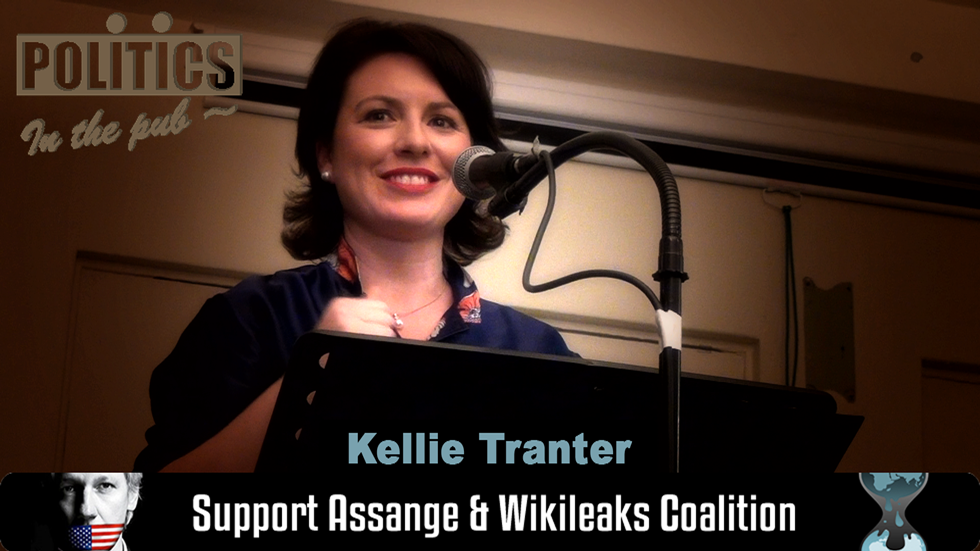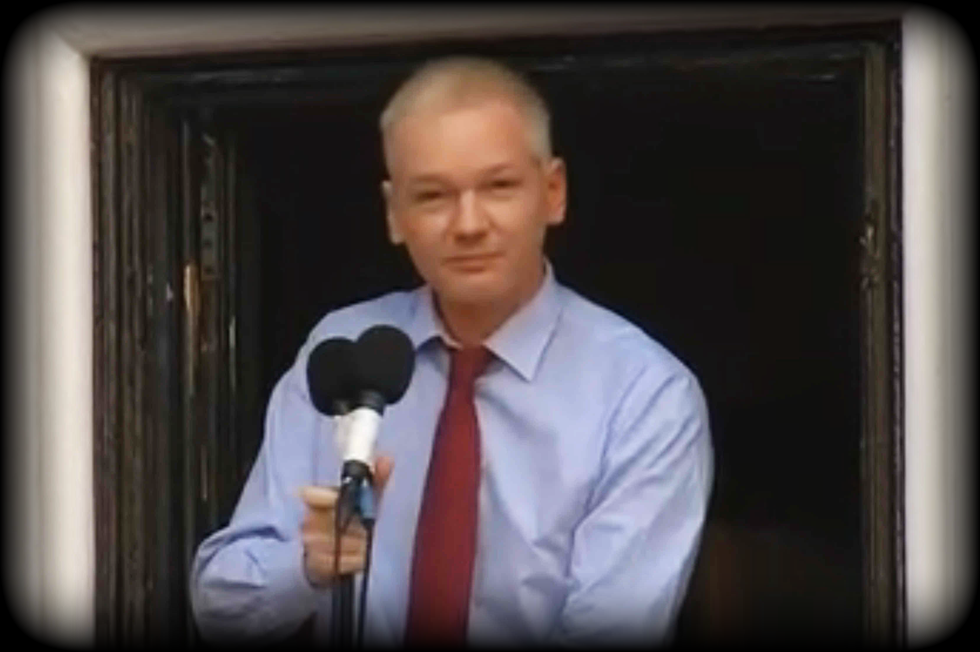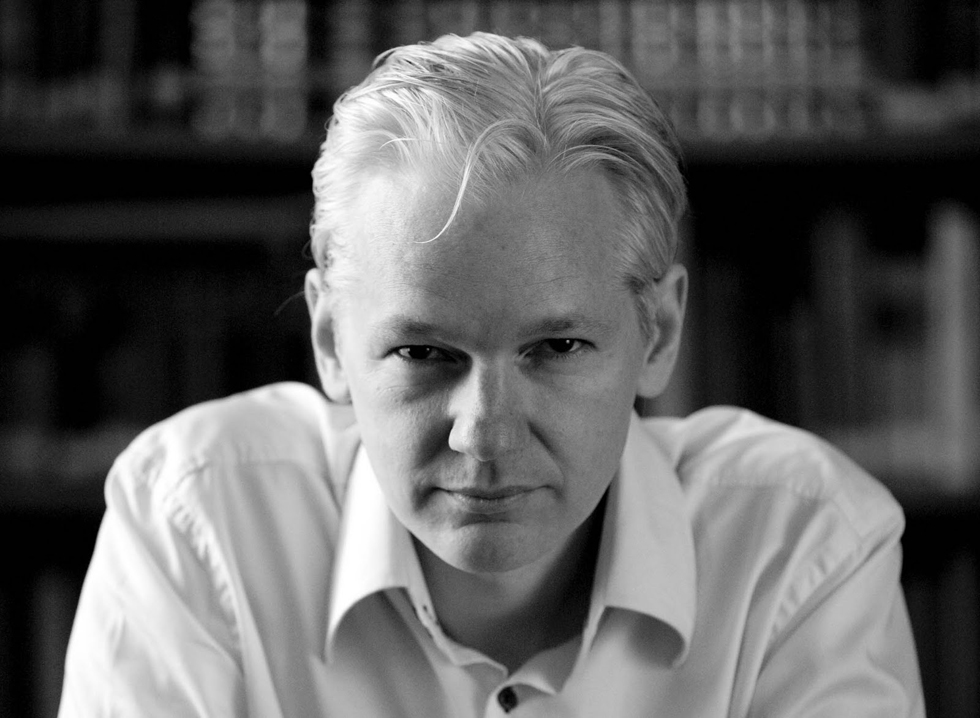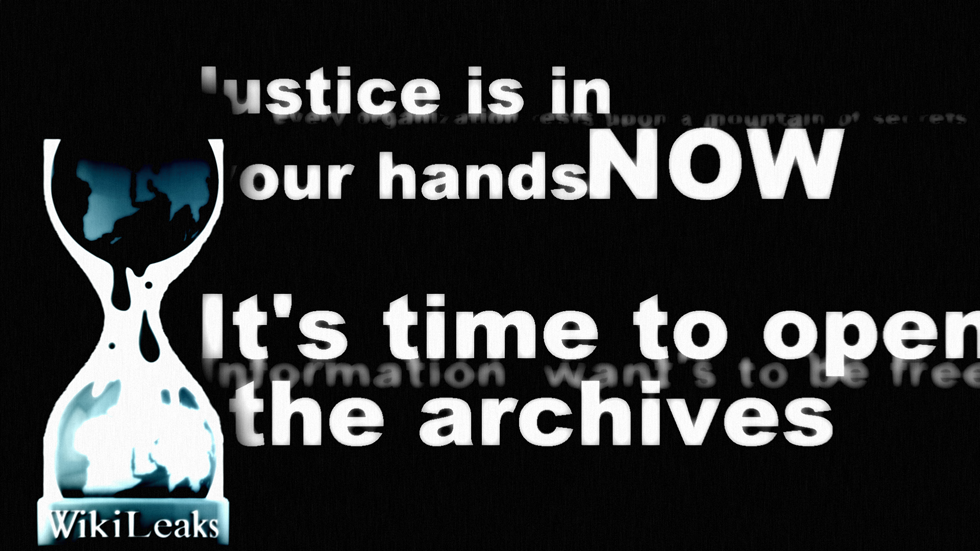
. ‘Julian Assange, Bradley Manning and Wikileaks:
. Can the global support movement hold the line?’
I’d like to thank both the organisers of this session of Politics in the Pub Sydney and Cassie Findlay from the Support Assange and WikiLeaks Coalition for their very kind invitation to speak this evening.
I thought I would take the opportunity at the outset to clear the air – so to speak - about a few matters relating to Julian Assange and WikiLeaks before moving onto the issue of the Global Support Movement “holding the line”.

Sweden
I suspect no one wants to answer the accusations being levelled against Assange more than Assange himself. People who have followed this issue closely would be aware of the attempts made by Assange and his lawyers, both during his time in Sweden and since, to make himself available for questioning. But like any of us, were we in his shoes, Assange would be weighing the odds and taking advice about whether or not it is safe to return to Sweden for questioning. Clearly it isn’t.
Our Government claims to have sought and received assurances from Sweden that Assange would receive “due process’’.
And yet in Jen Robinson’s Brief to Canberra dated 4 March 2011 she summarised her concerns about the case in Sweden including:
- the unlawful and prejudicial disclosures by police and the prosecution regarding ongoing criminal investigations;
- the failure to disclose details of the allegations and the evidence in English;
- the breaches of police procedures in the investigation of the allegations;
- the apparent failure of the Prosecutor to consider exculpatory evidence;
- the disproportionate behaviour of the Prosecutor in refusing voluntary offers for cooperation and refusing to make use of alternative methods for interviewing Julian – insisting instead on an international warrant which unduly restricts his liberty;
- the pre-trial detention conditions sought by the Prosecutor;
- the prospect of a secret trial; and adverse and prejudicial media coverage, fuelled by the state-funded lawyer for the complainants and the country’s most senior politicians, including the Prime Minister.
I have several copies of Jen Robinson’s full brief here with me if anyone is interested in reviewing it. It makes alarming reading. I invite you to investigate and consider, based on all of the factual information you can turn up, whether or not you consider due process has been followed in this case. You should bear in mind that the International Consortium of Investigative Journalists last year highlighted how Interpol Red Notices have been used to pursue political dissenters.
It is also worth noting Jen Robinson’s comment that ‘..The reason he [Assange] sought asylum when he did was because the Swedish prosecutor had announced in a press release that she would be placing him into custody and he would not have the bail conditions that he had complied with in the UK in Sweden. That meant that he physically did not have the opportunity once in Sweden to seek asylum with respect to the US plans to prosecute and extradite him.’
Let’s be clear that there is nothing stopping the Swedish Authorities from questioning Assange in the Ecuadorian Embassy. They initially indicated that there is no procedure for doing that, even though the Mutual Legal Assistance Scheme permits them to do so. Now they admit that there is a procedure, and according to Assange’s US lawyer, have recently questioned an alleged murderer in Serbia. Now the Swedish Authorities appear to be saying simply that it is not up to Assange to dictate the terms. Nobody seems concerned about the UK taxpayer paying up to 50,000 pounds a day it costs to guard that embassy.
 |
Extradition
There is a grand jury sitting in Alexandria Virginia 10GJ3793 (conspiracy to commit espionage).
Assange’s US lawyer disagrees with our Foreign Minister Bob Carr that it would be easier for the United States to extradite Assange from the United Kingdom. According to Michael Ratner, Assange’s US lawyer, the United Kingdom has robust avenues for fighting against extradition. Gary McKinnon for example has been fighting against his extradition for 8 years. He noted that Assange also has a lot of support in the United Kingdom. In Sweden, on the other hand, he would be imprisoned immediately and Sweden has no bail system but does have a rapid possible extradition procedure: Temporary Surrender under the US-Sweden Extradition Treaty.
It is assumed to be unlikely that the US would seek Assange’s extradition from the United Kingdom while there is a valid warrant from Sweden. Assange can’t, of course, be extradited and subject to capital punishment. The crime has to be punishable both under US law and Swedish/UK law and he can’t be extradited for a political crime. Much would depend on how the United States pleaded its extradition case, and one wonders whether extradition would be prevented if Assange will face cruel, inhuman or degrading treatment or punishment as we have seen Manning endure.
Even more disturbing are revelations from Jen Robinson that the “Australian Government has been requested to make representations to the United States about the ongoing criminal investigation and to seek an assurance that they would not prosecute for what is essentially journalistic activity. The Australian Government conceded in a meeting through the Attorney General that it is possible to seek that assurance. They can seek that assurance but they are specifically deciding not to.”
Just take a moment to reflect on that statement and query the decency of our elected representatives.
It may be true to say that Assange might ultimately receive a fair trial in Sweden or the United States, but before you need to consider that question, you must first consider the integrity of all of the political actors and the openness and fairness of the processes or means by which a person is brought to trial. If extradition is achieved through underhandedness, lies and diplomatic subterfuge, it hardly bolsters one's faith in the good intentions of the political actors.
 |
Did the leaks cause people to be harmed or killed?
WikiLeaks has published about half a million documents.
The possibility of outside consequences is a relevant consideration when considering the work of WikiLeaks. Fortunately there is no evidence of any direct personal consequences from the release of WikiLeaks documents. To be fair, there was recently a headline suggesting that a WikiLeaks cable had led Iran to hang a kick-boxer it claims was an Israeli spy who assassinated a nuclear scientist, but that story turned out to be false.
But another consideration that is at least equally as important is how those publications reveal the extent to which our own governments engage in conduct that on a personal level, all of us find abhorrent in the extent to which they will lie to their own citizens about what they’re doing in our names.
The violence and harm flowing from the perpetuation of the activities, the subject of the disclosure, is likely to be much greater than the violence or harm resulting from the disclosure itself.
As Noam Chomsky said, “Anyone who has spent time studying declassified documents is well aware that overwhelmingly, they are kept secret to protect elected officials from the scrutiny of citizens, not for defence or some other legitimate purpose.”
Is Assange a journalist and online publisher?
Assange has written and published many articles. Through WikiLeaks he has coordinated media partnerships and collaborations. For years now WikiLeaks has acquired and published important information about newsworthy global events, including information about which WikiLeaks thought it appropriate to give the United States Government notice to see if it wanted to assist with redactions to protect any information. It has no doubt also sought legal advice about the publication of documents. All of this has been done in a context of newsgathering and publishing.
In the ‘US Congressional Hearing into the Espionage Act and The Legal and Constitutional Issues Raised by WikiLeaks’ the following question was raised: “Does WikiLeaks enjoy the same protections as traditional journalism organisations, and in the Internet age, how do we distinguish between traditional media and the new media? And does the law contemplate such distinction?”.
This answer was provided by Mr. Geoffrey R. Stone, Professor and former Dean of the University of Chicago Law School: “I think realistically, it is impossible to do that. The Supreme Court itself, in interpreting the First Amendment, has always refused to define who the press is. And in any event, the speech clause, as has been noted, is an independent protection. So although that may be frustrating, I think as a practical reality there is no way to distinguish WikiLeaks from the New York Times or from a blogger. They are all part of the freedom of speech that the First Amendment protects…”
In fact Bill Keller from the New York Times may come to regret the day he described Assange as a source rather than an online publisher and journalist. Some members of a US House Judiciary subcommittee of Congress this year made it clear they want New York Times journalists charged under the Espionage Act for their stories about President Obama’s ‘Kill List’ and secret US cyber attacks against Iran.
 |
Ingredients of social movements
That brings me to the topic: Can the Global Support Movement Hold the Line? It’s a great question because there can be no real answer, only hope.
One common feature of Gandhi’s methods in the1930s, Danish “work to rule” under Nazi occupation, the sit-ins by black college students in Nashville, Tennessee in the 1960s, South African consumer boycotts and courageous strikes by workers in Poland and Chile in the 1980s, is that they show what can be achieved when ordinary people unite and act together to effect positive social change through non-violent means.
The critical ingredients in all of these popular movements were strong leadership, an articulated goal and a clear strategy. The common feature of the targets was political action or inaction that did not accord with what the majority of citizens wanted. And noticeably absent from the motivations of the citizens in each case was ego, money or greed.
On the balcony of the Ecuadorian embassy Assange said: “There is unity in the oppression. There must be absolute unity and determination in the response.”
To have unity and determination in the response social movements require certain attributes. Social movements involve pluralist behaviour or a collective effort. It’s a group of individuals like the Support Assange and WikiLeaks Coalition, acting within a community, aiming to win the support of the community for the establishment of a vehicle promoting their common interest.
Historically most movements have an issue, as well as an ideology that underpins the issue. These represent the structural elements of a movement and are the basic conditions which might induce you or I to action in a certain direction. In other words, the movement must connect directly to our everyday lives, so that if it succeeds, our lives will be changed in an obvious and better way.
I don’t propose to speak for the movements that currently exist in support of Assange, WikiLeaks or Manning but I would say that the ‘idea’ and ideology components of the movements would clearly include the value of free speech to a democratic society, and an acknowledgement that all rights that we have flow from having freedom of speech and that all threats to it have to be challenged vigorously by all of us.
So the idea or issue is what you’re specifically fighting for, and the ideology is the group of ideas that together give focus to what you’re trying to achieve. In this case you could say that the idea is to fight against repression of information, secrecy and government deception, whereas the ideology has as its goal an open, honest and humane society.
Assange has added flesh to the idea and ideology by saying, “As WikiLeaks stands under threat, so does the freedom of expression and the health of our societies. Will it return to and reaffirm the values it was founded on? Or will it lurch off the precipice dragging us all into a dangerous and oppressive world in which journalists fall silent under the fear of prosecution and citizens must whisper in the dark? The United States must pledge before the world that it will not pursue journalists for shining a light on the secret crimes of the powerful. There must be no more foolish talk about prosecuting any media organisation, be it WikiLeaks or the New York Times. The US administration’s war on whistle-blowers must end.”
 |
In other words, people’s lives can and will be changed when collectively we strive for freedom, dignity, justice and less corruption. What’s at stake is the right of the citizens of a country to know what their elected officials are doing. But having said that, the members of the movement will have to divine where public sentiment lies and how people already feel: as some activists describe it, “how to quicken the conscience of the public to get them to act on what they already know is wrong.
And that is a job that falls to all of the supporters actively involved in the movement. All supporters must present the issue, make the ideology attractive and hold the attention of the community with meetings, press, posters, demonstrations and participation. The movements must have carefully articulated goals, strategies and tactics. Winning the confidence of the masses will not be easy through the noise of mainstream media, let alone its direct attacks on Assange and WikiLeaks.
Supporters will need to recruit people like you or I and the unpoliticised by bringing people into closer proximity, and by continuing to form alliances with existing grassroots organisations who may have their own ideologies, but share a commitment to protect freedom of speech.
It is certainly much easier for a movement to grow with members, leaders and a communications network. I cannot emphasise enough the need to have intelligent, capable, charismatic leaders in any movement. Cassie is a fine example of that. And it will be her job, along with others just like her, to weed out the free-riders, to persuade people that this cause is worth fighting for; to invite people with a wide range of backgrounds and skills to join in to help and to generate support across the political, economic and social spectrums.
The leaders must continue to be seen as legitimate and effective by members, develop relationships with the media, perhaps set up offices with staff or volunteers and meet the legal requirements for doing so, raise funds and in their spare time de-bunk misinformation that runs contrary to the movement’s idea, ideology and goals.
There will need to be visible victories in order to tantalise would-be members. And as investigative journalist and writer Chris Hedges insists, the mission should be ‘How do you get people in power to be afraid of you?’ Many young people already recognise that issue and wear the badge of their dilemma, the Guy Fawkes mask from “V for Vendetta” where V famously said “People should not be afraid of their governments, governments should be afraid of their people.”
 |
It’s important to acknowledge that all social movements that have achieved anything have started very small. They often begin as being categorised as ineffectual, but when people persist the movement grows if truth is on its side, and the mainstream eventually catches up. Fortunately most people are morally principled so when they see and hear the truth they respond.
A good example was seen recently in Egypt, where the “revolution” didn’t simply occur in January 2011. It wasn’t a Facebook or Twitter revolution. It was a culmination of 10 years of mobilisation. Its model was horizontal. There was no hierarchy there, only a steering committee. It was highly decentralised. It focused on contentious politics and direct political action. Appealing to people directly on the street by door knocking and other means was a highly successful formula. Social media provided only an additional but important tool to strengthen the mobilisation. And they did all this away from state control in the streets and alternative spaces, which is why the State didn’t see it coming.
Obviously if Julian Assange forms a political party, he and that party will need to adopt a model to show themselves as a coherent political movement that is an alternative to existing parties. That shouldn’t be too difficult, and anything different to our major existing parties seems almost automatically attractive.
 |
But there remains just a word of caution about what seems to be a worldwide government crackdown on all sorts of social protest. The crackdown was graphically illustrated in Australia with riot squads and mounted police being sent in to disperse peaceful Occupy Wall Street protestors, and similar action was taken in America, Canada and Britain.
This is happening at a time when software is being developed by the private sector to turn open source data into actionable intelligence. When the identities of thousands of people can be swept up in a given area with a single request to a mobile phone network the danger to participants is obvious, so the organisers of all movements need to stay ahead of state-sponsored subversive activities. Leave the phone at home?
It is said that “one way to limit free speech is by the chilling effect of monitoring it”, and those in power are trying to do plenty of chilling.
 |
To those who may feel disempowered, or suffering from a little grassroots wilt, or reluctant to join this or any movement, I leave you with this gem, one of many from the interviews of Studs Terkel, when he interviewed the great philosopher Bertrand Russell:
STUDS TERKEL: Why do people, the great majority of people the world over, feel as helpless as they do, they feel as impotent as they do? This seems to be in the air, I’m sure, all over the world, feeling that the individual, I, John Smith, John Doe, says, “I can’t do anything about it.”
BERTRAND RUSSELL: That’s just [inaudible]. They can. I mean, an individual, if he has the pluck and the independence of mind, can do a very great deal. Actually, here we sit, no organi[s]ation, none whatever, and simply by expressing an opinion which is known to be unbiased, an individual can effect a very great deal. And this powerlessness of the individual is a form of cowardice; it’s a preten[c]e, an alibi for doing nothing.
So let’s drop the pretence and forsake the alibi. We are individuals but we’re part of a society. We aren’t ineffectual if only we do something. Now is the time to do it.
Thank you

...... Spoken by Kellie Tranter at "Politics in the Pub", September 21, 2012